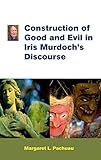Construction of good and evil in Iris Murdoch`s discourse
Material type: TextPublication details: New Delhi Atlantic 2007Description: 122pISBN: 9788126908097Subject(s): Literature | Iris Murdoch | English fiction | Good and evilDDC classification: 823.91409 Summary: A prominent experience of the post-war European generation was the acute inquiry about whether life was intrinsically good or evil, and of the good and evil combining to make the world what it is. These divided moral forces figure distinctively in the fiction of Iris Murdoch, one of the most prolific and serious contemporary novelists. She examines the nature of, and the relations between good and evil, innocence and experience, god and the devil. This book explores the concepts of good and evil as presented by Murdoch in relation to the structure of Christian theology pertaining to the same concepts.
Murdoch’s world is not an isolated world and it is one that is open to humane and communal fraternity. She questions the relationships that humans have with the center along with the centrality of many of our human assumptions. She recognizes at the same time the deep human need to be continually reseeking and redefining the center. She also denotes several themes in her text. These include elements of comedy, love, myth, magic and the supernatural.
The present book attempts to delve into the experiences of the post-war European mind and the dilemma between good and evil through texts of iris Murdoch. Beginning with an introduction to Murdoch as a novelist and her contribution to literature, the book elucidates and validates the concepts of good and evil in the backdrop of Christian religion in her selected texts. In addition, it analyses the Greek and Hebrew traditions as well as language content of the characters. The book will undoubtedly prove useful to students, teachers and researchers of English literature.
TextPublication details: New Delhi Atlantic 2007Description: 122pISBN: 9788126908097Subject(s): Literature | Iris Murdoch | English fiction | Good and evilDDC classification: 823.91409 Summary: A prominent experience of the post-war European generation was the acute inquiry about whether life was intrinsically good or evil, and of the good and evil combining to make the world what it is. These divided moral forces figure distinctively in the fiction of Iris Murdoch, one of the most prolific and serious contemporary novelists. She examines the nature of, and the relations between good and evil, innocence and experience, god and the devil. This book explores the concepts of good and evil as presented by Murdoch in relation to the structure of Christian theology pertaining to the same concepts.
Murdoch’s world is not an isolated world and it is one that is open to humane and communal fraternity. She questions the relationships that humans have with the center along with the centrality of many of our human assumptions. She recognizes at the same time the deep human need to be continually reseeking and redefining the center. She also denotes several themes in her text. These include elements of comedy, love, myth, magic and the supernatural.
The present book attempts to delve into the experiences of the post-war European mind and the dilemma between good and evil through texts of iris Murdoch. Beginning with an introduction to Murdoch as a novelist and her contribution to literature, the book elucidates and validates the concepts of good and evil in the backdrop of Christian religion in her selected texts. In addition, it analyses the Greek and Hebrew traditions as well as language content of the characters. The book will undoubtedly prove useful to students, teachers and researchers of English literature.
| Item type | Current library | Collection | Call number | Status | Date due | Barcode |
|---|---|---|---|---|---|---|
 BK
BK
|
Kannur University Central Library Stack | Stack | 823.91409 PAC/C (Browse shelf (Opens below)) | Available | 24168 |
Browsing Kannur University Central Library shelves, Shelving location: Stack, Collection: Stack Close shelf browser (Hides shelf browser)

|

|

|

|

|

|

|
||
| 823.91409 BIN/F The fictional world of Shashi Desh Pande: a critical study | 823.91409 KUM/C A critical study of Iris Murdoch`s fiction | 823.91409 MOR/C Contemporary fiction | 823.91409 PAC/C Construction of good and evil in Iris Murdoch`s discourse | 823.91409358 BAL/S Satire and the postcolonial novel: V.S. Naipaul, Chinua Achebe, Salman Rushdie | 823.91409358 VIC/H Holocaust fiction | 823.92 BEC/A August |
A prominent experience of the post-war European generation was the acute inquiry about whether life was intrinsically good or evil, and of the good and evil combining to make the world what it is. These divided moral forces figure distinctively in the fiction of Iris Murdoch, one of the most prolific and serious contemporary novelists. She examines the nature of, and the relations between good and evil, innocence and experience, god and the devil. This book explores the concepts of good and evil as presented by Murdoch in relation to the structure of Christian theology pertaining to the same concepts.
Murdoch’s world is not an isolated world and it is one that is open to humane and communal fraternity. She questions the relationships that humans have with the center along with the centrality of many of our human assumptions. She recognizes at the same time the deep human need to be continually reseeking and redefining the center. She also denotes several themes in her text. These include elements of comedy, love, myth, magic and the supernatural.
The present book attempts to delve into the experiences of the post-war European mind and the dilemma between good and evil through texts of iris Murdoch. Beginning with an introduction to Murdoch as a novelist and her contribution to literature, the book elucidates and validates the concepts of good and evil in the backdrop of Christian religion in her selected texts. In addition, it analyses the Greek and Hebrew traditions as well as language content of the characters. The book will undoubtedly prove useful to students, teachers and researchers of English literature.


There are no comments on this title.